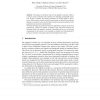Free Online Productivity Tools
i2Speak
i2Symbol
i2OCR
iTex2Img
iWeb2Print
iWeb2Shot
i2Type
iPdf2Split
iPdf2Merge
i2Bopomofo
i2Arabic
i2Style
i2Image
i2PDF
iLatex2Rtf
Sci2ools
FORTE
2009
2009
Epistemic Logic for the Applied Pi Calculus
We propose an epistemic logic for the applied pi calculus, which is a variant of the pi calculus with extensions for modeling cryptographic protocols. In such a calculus, the security guarantees are usually stated as equivalences. While process calculi provide a natural means to describe the protocols themselves, epistemic logics are often better suited for expressing certain security properties such as secrecy and anonymity. We intend to bridge the gap between these two approaches: using the set of traces generated by a process as models, we define a logic which has constructs for reasoning about both intruder's epistemic knowledge and the set of messages in possession of the intruder. As an example we consider two formalizations of privacy in electronic voting and study the relationship between them.
| Added | 17 Feb 2011 |
| Updated | 17 Feb 2011 |
| Type | Journal |
| Year | 2009 |
| Where | FORTE |
| Authors | Rohit Chadha, Stéphanie Delaune, Steve Kremer |
Comments (0)

